2016 Major Criminal Cases
 The criminal enforcement program investigates and assists in the prosecution of knowing or negligent environmental violations. This year’s cases resulted in a total of 93 years of incarceration for individual defendants, plus fines of $14 million for individual and corporate defendants, with an additional $775,000 in court ordered environmental projects and $193 million in restitution. The write-ups below summarize information contained in public press releases.
The criminal enforcement program investigates and assists in the prosecution of knowing or negligent environmental violations. This year’s cases resulted in a total of 93 years of incarceration for individual defendants, plus fines of $14 million for individual and corporate defendants, with an additional $775,000 in court ordered environmental projects and $193 million in restitution. The write-ups below summarize information contained in public press releases.
Clean Water Act
XS Platinum Mine (James Slade)
 Aerial Photo of Salmon RiverJames Slade, of Calgary, Canada, was sentenced to 12 months in prison for knowing and negligent violations of the Clean Water Act. Slade was convicted of felony and misdemeanor Clean Water Act crimes for discharging polluted wastewater into the Salmon River while serving as the Chief Operating Officer of the Platinum Creek Mine located in western Alaska. Evidence at trial showed that the pollution was hundreds of times over the legal limits set in the mine’s discharge permit, issued by the State of Alaska.
Aerial Photo of Salmon RiverJames Slade, of Calgary, Canada, was sentenced to 12 months in prison for knowing and negligent violations of the Clean Water Act. Slade was convicted of felony and misdemeanor Clean Water Act crimes for discharging polluted wastewater into the Salmon River while serving as the Chief Operating Officer of the Platinum Creek Mine located in western Alaska. Evidence at trial showed that the pollution was hundreds of times over the legal limits set in the mine’s discharge permit, issued by the State of Alaska.
The illegal pollution occurred throughout the 2010 and 2011 mining seasons. At sentencing, the United States presented evidence from a biologist who took samples of the murky wastewater being discharged into the Salmon River in September 2011. Laboratory analysis showed that the wastewater contained levels of metals that can be deadly to fish and other aquatic life. For more information, read the complete case summary.
Energy Resource Technology GOM, LLC
Energy Resource Technology GOM, LLC (ERT) was sentenced on April 6, 2016 to three years of probation and ordered to pay a $4 million fine and $200,000 in community service after pleading guilty to two felony counts of violating the Outer Continental Shelf Lands Act and two felony counts of violating the Clean Water Act. The crimes occurred at ERT’s offshore oil production facilities in the Gulf of Mexico.
According to court documents, in late November 2012, ERT knowingly and willfully failed to comply with safety requirements for welding and associated “hot work” activities. Those regulations are intended to prevent explosions which can occur when welding activities are improperly performed near oil and gas wells, tanks and lines. ERT also knowingly and willfully failed to comply with the regulations for testing their blowout preventer – a system designed to ensure well control and prevent potential releases of oil and gas. ERT also violated the Clean Water Act by tampering with the method of collecting certain water discharge samples. The company’s Discharge Monitoring Reports from October 2012 through March 2014 showed that its platforms were not discharging oil and grease in excess of the permit requirements, but an internal ERT investigation showed that multiple platforms were shown to be in violation of the monthly discharge allowances. ERT self-reported the results of their investigation to U.S. officials, and from April 2014 through June 2014, discharge monitoring samples correctly taken by ERT showed several of their platforms in the Gulf of Mexico were discharging oil and grease in excess of their monthly allowance under the Permit.
ERT’s most recent Clean Water Act violation occurred on or about June 9, 2015 when two contract operators on one of their platforms put a release hose over the edge of the platform, causing well bore fluid mixed with hydrocarbons to shoot out into the Gulf of Mexico. For more information, read the complete case summary.
Freedom Industries
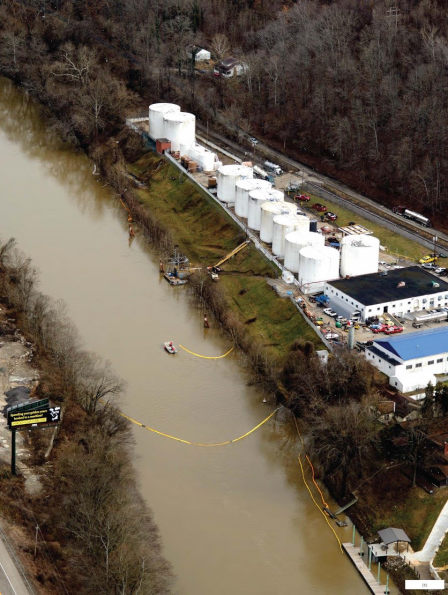 Aerial photo showing equipment used to contain spillFreedom Industries, Inc., in Charleston, West Virginia, and a former plant manager of Freedom Industries were sentenced on February 4, 2016, for environmental crimes connected to the January 2014 Elk River chemical spill that shut down drinking water supplies for approximately 300,000 people in Charleston and surrounding counties for over a week. Thousands of gallons of a chemical used for cleaning coal (MCHM) leaked from the company’s tank farm into the Elk River, flowed into a water treatment plant, and contaminated the water supply. As a result of the spill, the local economy nearly ground to a halt. Schools shut down, hospitals had to cancel non-essential surgeries, and restaurants were forced to close, leaving many people out of work.
Aerial photo showing equipment used to contain spillFreedom Industries, Inc., in Charleston, West Virginia, and a former plant manager of Freedom Industries were sentenced on February 4, 2016, for environmental crimes connected to the January 2014 Elk River chemical spill that shut down drinking water supplies for approximately 300,000 people in Charleston and surrounding counties for over a week. Thousands of gallons of a chemical used for cleaning coal (MCHM) leaked from the company’s tank farm into the Elk River, flowed into a water treatment plant, and contaminated the water supply. As a result of the spill, the local economy nearly ground to a halt. Schools shut down, hospitals had to cancel non-essential surgeries, and restaurants were forced to close, leaving many people out of work.
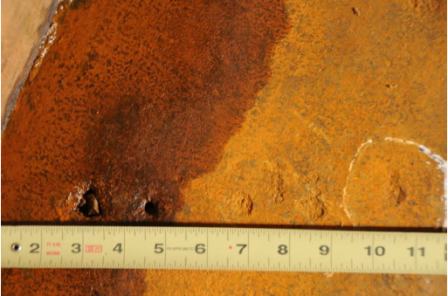 Chemical Safety Board photo showing visible metallurgical failures on the bottom interior surface of the tank that leaked into the Elk RiverFreedom admitted that it should have taken reasonable steps to ensure that MCHM did not leak into the Elk River. Factors contributing to the spill included:
Chemical Safety Board photo showing visible metallurgical failures on the bottom interior surface of the tank that leaked into the Elk RiverFreedom admitted that it should have taken reasonable steps to ensure that MCHM did not leak into the Elk River. Factors contributing to the spill included:
- Failure to maintain the containment area that was supposed to prevent a chemical spill from reaching the Elk River.
- Failure to inspect and maintain the storage tank holding MCHM.
- Failure to implement and maintain a storm water and groundwater plan (In spite of the permit requirements).
- Failure to conduct the necessary training to ensure all personnel were working in compliance with environmental laws.
- Failure to have adequate spill prevention material on hand with no booms or other materials to stem the flow of MCHM.
Freedom, which declared bankruptcy soon after the incident, was sentenced to a fine of $900,000, to be paid after all other claims against the company are satisfied. Former Freedom president, Gary Southern, was sentenced to 30 days imprisonment, a six month term of supervised released and was fined $20,000. Dennis Farrell, a former owner, was sentenced to 30 days in federal prison, six months of supervised release, and a $20,000 fine. The former plant manager, Mike Burdette, was sentencenced to three years probation and fined $2,500. In addition, three other company officials and the environmental consultant were sentenced to varying fines and probation terms. For more information, read the complete case summary.
American Waste (Timothy Howard)
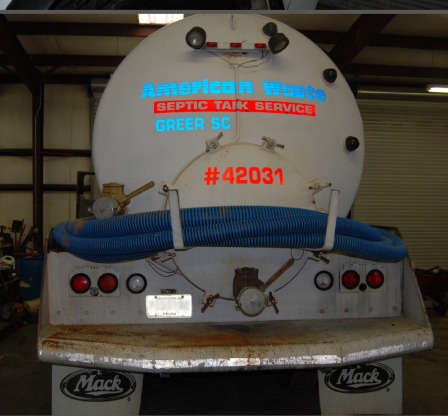 American Waste septage hauling truckTimothy Howard, of Greer, South Carolina was sentenced on August 11, 2016 in federal court in Anderson, South Carolina, for violating Pretreatment Standards of the Clean Water Act. Howard received 18 months imprisonment, a $10,000.00 fine, and 1 year of supervised release.
American Waste septage hauling truckTimothy Howard, of Greer, South Carolina was sentenced on August 11, 2016 in federal court in Anderson, South Carolina, for violating Pretreatment Standards of the Clean Water Act. Howard received 18 months imprisonment, a $10,000.00 fine, and 1 year of supervised release.
Evidence presented at the change of plea hearing showed that Howard illegally dumped waste at unauthorized locations connected to the Renewable Water Resources (ReWa) and Town of Lyman Sewage Systems. Evidence presented at the sentencing hearing also showed that, during the course of the investigation, Howard made false statements to local law enforcement and submitted hauling log records to the South Carolina Department of Health and Environmental Control (DHEC) which omitted over 85% of his septage handling activities and obstructed the investigation. For more information, read the complete case summary.
Waste Management of Hawaii, Inc. (Joseph Whelan, Justin Lottig)
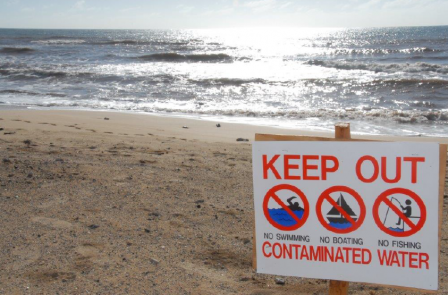 Sign posted at beach after WMI dischargeOn October 26, 2015, Waste Management of Hawaii, Inc., (WMH), Joseph R. Whelan, the company’s general manager and vice president, and Justin H. Lottig, the company’s environmental protection manager, were sentenced in federal district court for the District of Hawaii. WMH was sentenced to pay a $400,000 fine; and $200,000 in restitution. Whelan and Lottig were sentenced to pay criminal fines of $25,000 each. They were sentenced for negligently discharging pollutants into a water of the U.S. without having a National Pollutant Discharge Elimination System (NPDES) permit.
Sign posted at beach after WMI dischargeOn October 26, 2015, Waste Management of Hawaii, Inc., (WMH), Joseph R. Whelan, the company’s general manager and vice president, and Justin H. Lottig, the company’s environmental protection manager, were sentenced in federal district court for the District of Hawaii. WMH was sentenced to pay a $400,000 fine; and $200,000 in restitution. Whelan and Lottig were sentenced to pay criminal fines of $25,000 each. They were sentenced for negligently discharging pollutants into a water of the U.S. without having a National Pollutant Discharge Elimination System (NPDES) permit.
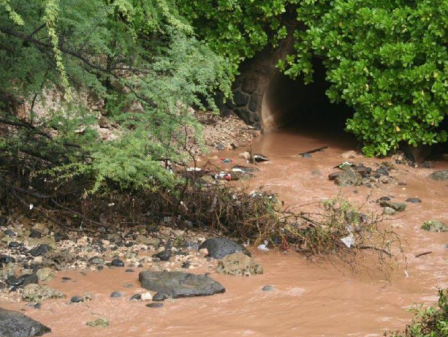 Contaminated storm water discharging from landfill outfalls into lagoonThe charges stem from illegal discharges of contaminated storm water from the Waimanalo Gulch Sanitary Landfill into Hawaii’s coastal waters after heavy rainfalls in December 2010 and January 2011. WMH was permitted to discharge storm water from the landfill to the Pacific Ocean under a NPDES permit issued by the Hawaii Department of Health Clean Water Branch.
Contaminated storm water discharging from landfill outfalls into lagoonThe charges stem from illegal discharges of contaminated storm water from the Waimanalo Gulch Sanitary Landfill into Hawaii’s coastal waters after heavy rainfalls in December 2010 and January 2011. WMH was permitted to discharge storm water from the landfill to the Pacific Ocean under a NPDES permit issued by the Hawaii Department of Health Clean Water Branch.
The storm water was required to go through the landfill’s storm water management system to ensure that it did not come into contact with waste in the landfill before being discharged to Hawaii’s coastal waters. The NPDES permit prohibited WMH from causing or contributing to a violation of Hawaii’s state water quality standards. For more information, read the complete case summary.
FX Drilling
 View of spill toward rupture siteOn August 15, 2016, FX Drilling, Inc. was sentenced to pay a $100,000 fine after previously pleading guilty to charges stemming from a 2011 oil spill in northwestern Montana. The company negligently discharged oil into waters of the United States, in violation of the Clean Water Act and failed to immediately notify federal officials in violation of the Oil Pollution Act. At the time of its plea, the company had already paid more than $321,000 in clean-up costs.
View of spill toward rupture siteOn August 15, 2016, FX Drilling, Inc. was sentenced to pay a $100,000 fine after previously pleading guilty to charges stemming from a 2011 oil spill in northwestern Montana. The company negligently discharged oil into waters of the United States, in violation of the Clean Water Act and failed to immediately notify federal officials in violation of the Oil Pollution Act. At the time of its plea, the company had already paid more than $321,000 in clean-up costs.
On July 14, 2011, approximately 840 gallons of oil and production fluid leaked from a cracked line at an oil field on a Blackfeet Indian Reservation. The spill spread over land nearly a mile to Cut Bank Creek, where it was spotted by a rancher and reported to local tribal officials. They informed FX Drilling of the spill but the company never reported it to the National Response Center. The field supervisor discovered the 3-inch line connecting two oil wells had cracked. The line was fixed but the supervisor and the company did not take steps to clean up the oil that had already leaked. For more information, read the complete case summary.
Clean Air Act
Green Diesel (Philip Rivkin)
Philip Joseph Rivkin, aka Felipe Poitan Arriaga, was sentenced on March 7, 2016 in Houston, Texas, to 121 months in prison and payment of more than $87 million in restitution, for generating and selling fraudulent biodiesel credits in the federal renewable fuel program. Rivkin was also ordered to forfeit $51 million.
The Energy Independence and Security Act of 2007 created requirements and incentives for the production of renewable fuels, including biodiesel, in order to encourage their use in the United States. Authorized biodiesel producers and importers could generate and attach credits—known as renewable identification numbers (RINs)—to biodiesel they produced or imported. RINs can be separated from the fuel and sold independently, because certain companies need RINs to comply with regulatory obligations under the Act.
Beginning around February of 2009, Rivkin operated and controlled several companies in the fuel and biodiesel industries, including Green Diesel LLC, Fuel Streamers Inc. and Petro Constructors LLC, all based in Houston. Claiming that Green Diesel produced millions of gallons of biodiesel, Rivkin generated and sold over 60 million fraudulent RINs – which were sold to companies that needed to collect them for compliance purposes. In reality, no biodiesel was ever produced. Rivkin created false records and made false statements to conceal his fraudulent claims of biodiesel production, importation and RIN generation. For more information, read the complete case summary.
Joseph Furando and E-Biofuels
Joseph Furando, 50, of Montvale, New Jersey, was sentenced on January 7, 2016 in Indianapolis, Indiana, to 20 years in prison and payment of more than $56 million in restitution for his role in an elaborate RINs fraud scheme. Furando is also obligated to forfeit the material gains from his crime, which include a Ferrari, other cars, a million-dollar home, and artwork.
From 2007 through 2012, Indiana-based E‑biofuels owned a biodiesel manufacturing plant in Middletown, Indiana. Properly manufactured biodiesel was eligible for a dollar per gallon tax credit, and also generated Renewable Identification Numbers (RINs) which could be sold to petroleum refiners and importers, who needed to demonstrate compliance with federal renewable fuel obligations. Each tax credit and RIN can legally be generated and used only once for each unit of biodiesel actually produced.
Furando admitted that sometime in late 2009, he and his companies, New Jersey-based defendants Caravan Trading Company and CIMA Green, began supplying E‑biofuels with biodiesel that was actually made by other companies and had already been used to claim tax credits and RINs. Because these incentives had already been claimed, Furando could purchase the biodiesel at much lower prices, sometimes for more than two dollars per gallon less than biodiesel that was still eligible for the credits. Furando supplied the product to E‑biofuels and his co-conspirators would claim that E-biofuels made the fuel and then they would illegally re-certify the fuel and sell it at the much higher market price for incentivized biodiesel, known as B100 with RINs. Among his co-conspirators, Furando referred to this fraud scheme as “Alchemy.”
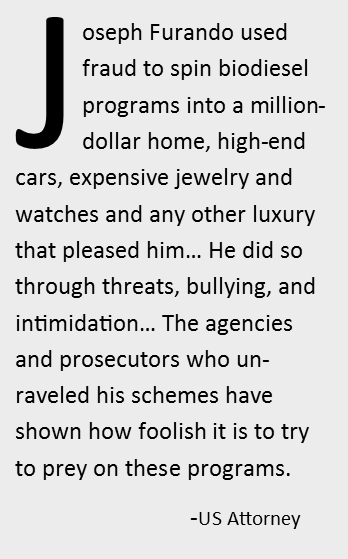 Furando, his New Jersey-based companies and his Indiana-based co-defendants realized huge profits through this scheme, sometimes in excess of $15,000 per truckload of fuel. Over the course of approximately two years, the defendants fraudulently sold more than 35 million gallons of fuel for a total cost of over $145.5 million. The defendants realized more than $55 million in gross profits, at the expense of their customers and U.S. taxpayers.
Furando, his New Jersey-based companies and his Indiana-based co-defendants realized huge profits through this scheme, sometimes in excess of $15,000 per truckload of fuel. Over the course of approximately two years, the defendants fraudulently sold more than 35 million gallons of fuel for a total cost of over $145.5 million. The defendants realized more than $55 million in gross profits, at the expense of their customers and U.S. taxpayers.
U.S. Attorney Minkler stated “Joseph Furando used fraud to spin biodiesel programs into a million-dollar home, high-end cars, expensive jewelry and watches and any other luxury that pleased him… He did so through threats, bullying, and intimidation. With the court’s sentence, all of that unraveled. The agencies and prosecutors who unraveled his schemes have shown how foolish it is to try to prey on these programs.”
In separate hearings, the three corporations at the heart of the scheme were also sentenced for their joint liability in the scheme. Furando’s companies, CIMA Green LLC, and Caravan Trading LLC, were both sentenced to pay $56 million in restitution and million dollar fines. The companies, which are largely defunct, must serve two years’ probation to ensure that what assets remain are properly directed toward victims. Toward that end, the court imposed, but suspended, the fines. The third company, E‑biofuels LLC, operated by Furando’s co-defendants Craig Ducey, Chad Ducey and Chris Ducey, was also sentenced to pay the $56 million in restitution. E-biofuels is in bankruptcy and its few remaining assets are being distributed to creditors and victims through the bankruptcy process. Another co-conspirator, Brian Carmichael, was charged in a separate case. Carmichael cooperated with the government before the criminal cases were filed. In December 2015, he received a sentence of five years of imprisonment. For more information, read the complete case summary.
Resource Conservation and Recovery Act (RCRA)
JACAM Manufacturing
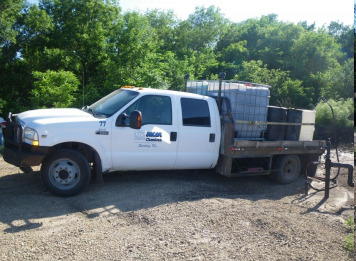 JACAM Manufacturing truck with hose connected to tankJACAM Manufacturing, LLC, a chemical manufacturing company in Sterling, Kansas, pleaded guilty to felony violations of the Safe Water Drinking Act and the Resource Conservation Recovery Act and paid a $1 million fine. In its plea, the company admitted to knowingly and willfully disposing of hazardous wastes in an injection well that was permitted only for the disposal of salt water. JACAM also admitted it was knowingly disposing of acetone, benzene and other hazardous chemicals into the well. The Safe Water Drinking Act identifies salt water disposal wells as a potential source of pollution to the nation’s underground aquifers. The Resource Conservation Recovery Act created a “cradle-to-gave” regulatory scheme to track hazardous wastes from their point of generation to their final disposal. For more information, read the complete case summary.
JACAM Manufacturing truck with hose connected to tankJACAM Manufacturing, LLC, a chemical manufacturing company in Sterling, Kansas, pleaded guilty to felony violations of the Safe Water Drinking Act and the Resource Conservation Recovery Act and paid a $1 million fine. In its plea, the company admitted to knowingly and willfully disposing of hazardous wastes in an injection well that was permitted only for the disposal of salt water. JACAM also admitted it was knowingly disposing of acetone, benzene and other hazardous chemicals into the well. The Safe Water Drinking Act identifies salt water disposal wells as a potential source of pollution to the nation’s underground aquifers. The Resource Conservation Recovery Act created a “cradle-to-gave” regulatory scheme to track hazardous wastes from their point of generation to their final disposal. For more information, read the complete case summary.
Max Spatig
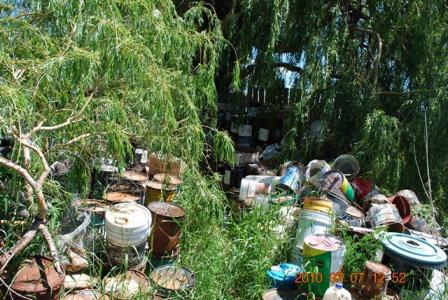 Photo from press release showing corroded, illegally stored hazardous waste containersMax Spatig of Rexburg, Idaho, the owner of MS Enterprises, was sentenced on October 9, 2015 to 46 months in prison and payment of $498,652 in restitution for knowingly storing and disposing of hazardous waste without a permit on a property near Rexburg.
Photo from press release showing corroded, illegally stored hazardous waste containersMax Spatig of Rexburg, Idaho, the owner of MS Enterprises, was sentenced on October 9, 2015 to 46 months in prison and payment of $498,652 in restitution for knowingly storing and disposing of hazardous waste without a permit on a property near Rexburg.
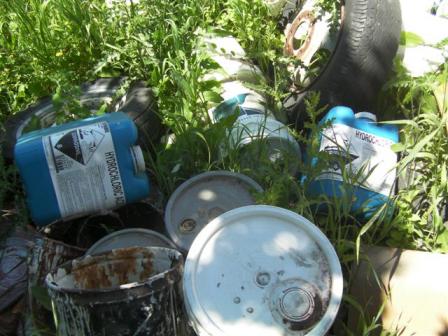 Over 3,400 hazardous waste containers were stockpiled at the property outside of RexburgSpatig was convicted following a two-week jury trial in June. According to the evidence introduced at trial, in July 2010, a total of 3,478 containers of waste were found on the property outside of Rexburg. Neither MS Enterprises nor Spatig had permits from the Environmental Protection Agency (EPA) or the Idaho Department of Environmental Quality (DEQ) that would have covered the operation of a hazardous waste dump. The containers had been left outdoors for years; many were labeled as containing hazardous materials and corroded. Samples confirmed that the contents were hazardous waste due to ignitability and corrosivity. (Ignitable wastes present a fire hazard, and corrosive wastes cause other materials to dissolve on contact.) An emergency cleanup by EPA Superfund personnel cost $498,652.
Over 3,400 hazardous waste containers were stockpiled at the property outside of RexburgSpatig was convicted following a two-week jury trial in June. According to the evidence introduced at trial, in July 2010, a total of 3,478 containers of waste were found on the property outside of Rexburg. Neither MS Enterprises nor Spatig had permits from the Environmental Protection Agency (EPA) or the Idaho Department of Environmental Quality (DEQ) that would have covered the operation of a hazardous waste dump. The containers had been left outdoors for years; many were labeled as containing hazardous materials and corroded. Samples confirmed that the contents were hazardous waste due to ignitability and corrosivity. (Ignitable wastes present a fire hazard, and corrosive wastes cause other materials to dissolve on contact.) An emergency cleanup by EPA Superfund personnel cost $498,652.
Spatig had engaged in similar conduct before: in 2005, the State of Idaho prosecuted him for criminal nuisance and spent $188,000 to clean up hazardous waste at his property in Jefferson County; and earlier still, Spatig had necessitated cleanup of a Kaysville, Utah, site. For more information, read the complete case summary.
Federal Insecticide Fungicide and Rodenticide Act (FIFRA)
Sunland Pest Control Services, Inc. (Grenale Williams, Canarie Curry)
Sunland Pest Control Services Inc. (Sunland), Grenale Williams, 53, of South Bay, Florida, and Canarie Deon Curry, 40, of Riviera Beach, Florida, were sentenced on May 12, 2016, in connection with their knowing violations of the federal pesticide law, which caused serious neurological injuries to a child. The defendants had previously pleaded guilty to knowing and illegal application of the insecticide sulfuryl fluoride during a residential fumigation in South Florida. Sunland also pleaded guilty to making false statements in connection with the investigation. Williams and Curry were each sentenced to one year in prison. Sunland was sentenced to five years of corporate probation.
In June 2015, the victim’s family contracted with Terminix for a home fumigation for termites under an existing warranty. Terminix subcontracted the job to Sunland. The fumigation occurred over a weekend and the family returned home on Sunday, Aug. 16, 2015, to find a clearance tag on the front door indicating that it was safe to enter. That evening, several family members became ill, and medical attention was sought for their nine-year old son.
A subsequent investigation revealed that the defendants knowingly violated numerous pesticide label requirements for use of the potentially deadly gas including:
- Failure to provide their customers with the Fact Sheet for the pesticide being used;
- Failure to have the required number of properly trained personnel on site following the application of the pesticide;
- Failure to properly aerate the fumigated space; and
- Failure to conduct clearance testing with an approved and calibrated low fumigant level detection device.
The investigation also revealed the Defendants placed the clearance tag at the premises indicating it was safe to enter, despite the fact that the required procedures had not been completed. The family was later falsely assured by Terminix and Sunland that the aeration and clearance requirements had been met. Moreover, Sunland representatives misrepresented the specific brand of pesticide that was used and falsely claimed that the fumigation, aeration and clearance of the home had been completed in accordance with the law. For more information, read the complete case summary.
Title 18
Environmental Management of Illinois, Inc. (Eric Andrews, Joel Andrews)
Brothers Joel and Eric Andrews, former owners of Environmental Management of Illinois, Inc. (EMI), Springfield, Illinois, were sentenced on March 30, 2016, to federal prison terms of three years and two and one-half years, respectively, for a scheme that defrauded the Illinois Environmental Protection Agency of millions of dollars. Co-defendant Michael Keebler, who bought the business in 2006, was sentenced the previous August to five years in prison for the scheme. The defendants are all subject to the court’s order to pay restitution of $13.36 million to the Illinois EPA, minus any appropriate offsets.
Over a dozen years, from 2001 to 2013, the defendants swindled money from an Illinois EPA fund to clean up contamination from leaking underground storage tanks. EMI worked with property owners to clean up sites contaminated by petroleum leaks, spills, or overfills from underground storage tanks. The firm sought reimbursement of its costs from the state EPA fund. The defendants admitted that they conspired to defraud the fund by artificially inflating cleanup expenses. For example, agreements were made with vendors to submit two invoices for certain services -- one that listed the actual costs of the service provided and the payment to be made by EMI, and a second, to be used for reimbursement, which inflated the amount of work performed and supplies used, the amount charged for the work, or both. For more information, read the complete case summary.
